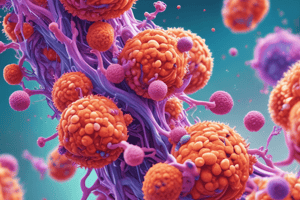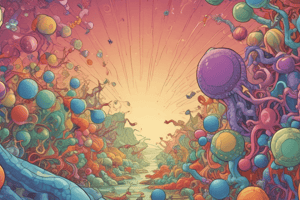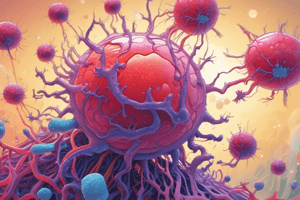Podcast
Questions and Answers
Which component of the immune system is chiefly responsible for T-cell maturation?
Which component of the immune system is chiefly responsible for T-cell maturation?
- Thymus Gland (correct)
- Spleen
- Lymph Nodes
- Bone Marrow
What is the primary function of B-cells in the immune response?
What is the primary function of B-cells in the immune response?
- Produce antibodies (correct)
- Filter lymph
- Regulate T-cells
- Attack pathogens directly
Which of the following statements about lymph nodes is true?
Which of the following statements about lymph nodes is true?
- They produce red blood cells.
- They filter lymph for pathogens. (correct)
- They primarily store platelets.
- They are found primarily in the bloodstream.
What role does the spleen play in the immune system?
What role does the spleen play in the immune system?
What is the primary function of lymph nodes in the immune system?
What is the primary function of lymph nodes in the immune system?
Which type of immunoglobulin is associated with immediate allergic responses?
Which type of immunoglobulin is associated with immediate allergic responses?
What is the term for the recognition of pathogens by the immune system?
What is the term for the recognition of pathogens by the immune system?
Which of the following hormones is crucial for the maturation of T cells?
Which of the following hormones is crucial for the maturation of T cells?
Peyer's patches are primarily located in which part of the body?
Peyer's patches are primarily located in which part of the body?
Which immune cell is primarily responsible for engulfing and destroying pathogens?
Which immune cell is primarily responsible for engulfing and destroying pathogens?
What is the main role of antibodies in the immune response?
What is the main role of antibodies in the immune response?
What function do platelets serve in the circulatory system?
What function do platelets serve in the circulatory system?
Which part of the body is primarily involved in the production of B cells?
Which part of the body is primarily involved in the production of B cells?
How do flowcharts in immune studies enhance understanding of immune responses?
How do flowcharts in immune studies enhance understanding of immune responses?
What is the significance of antigen-antibody interactions in immune defense?
What is the significance of antigen-antibody interactions in immune defense?
Which lymphoid organ is primarily responsible for filtering blood and producing immune responses?
Which lymphoid organ is primarily responsible for filtering blood and producing immune responses?
What is the main function of platelets in the blood?
What is the main function of platelets in the blood?
How do T-cells contribute to the immune response?
How do T-cells contribute to the immune response?
Which hormone is primarily responsible for the maturation of T-cells?
Which hormone is primarily responsible for the maturation of T-cells?
What role does the spleen play in relation to lymphocytes?
What role does the spleen play in relation to lymphocytes?
What is a key characteristic of neutrophils in the immune response?
What is a key characteristic of neutrophils in the immune response?
Which of the following describes lymph nodes?
Which of the following describes lymph nodes?
What is the primary function of red blood cells (RBCs)?
What is the primary function of red blood cells (RBCs)?
What is the significance of blood type compatibility?
What is the significance of blood type compatibility?
Flashcards
Bone Marrow
Bone Marrow
Produces red blood cells (RBCs), white blood cells (WBCs), and platelets, which are essential for blood clotting and immune responses.
Thymus Gland
Thymus Gland
Site of T-cell maturation, where these immune cells learn to distinguish between self and non-self cells.
Spleen
Spleen
Filters lymph, stores lymphocytes (special WBCs), and removes old or damaged red blood cells.
Lymph Nodes
Lymph Nodes
Signup and view all the flashcards
Lymphocytes
Lymphocytes
Signup and view all the flashcards
B-cells
B-cells
Signup and view all the flashcards
T-cells
T-cells
Signup and view all the flashcards
Peyer's Patches
Peyer's Patches
Signup and view all the flashcards
Lymphoid Organs
Lymphoid Organs
Signup and view all the flashcards
Macrophages
Macrophages
Signup and view all the flashcards
Immune Response
Immune Response
Signup and view all the flashcards
Antigen
Antigen
Signup and view all the flashcards
Antibodies
Antibodies
Signup and view all the flashcards
Immune Memory
Immune Memory
Signup and view all the flashcards
Hemopoiesis
Hemopoiesis
Signup and view all the flashcards
Platelets
Platelets
Signup and view all the flashcards
Lymph
Lymph
Signup and view all the flashcards
Erythropoiesis
Erythropoiesis
Signup and view all the flashcards




